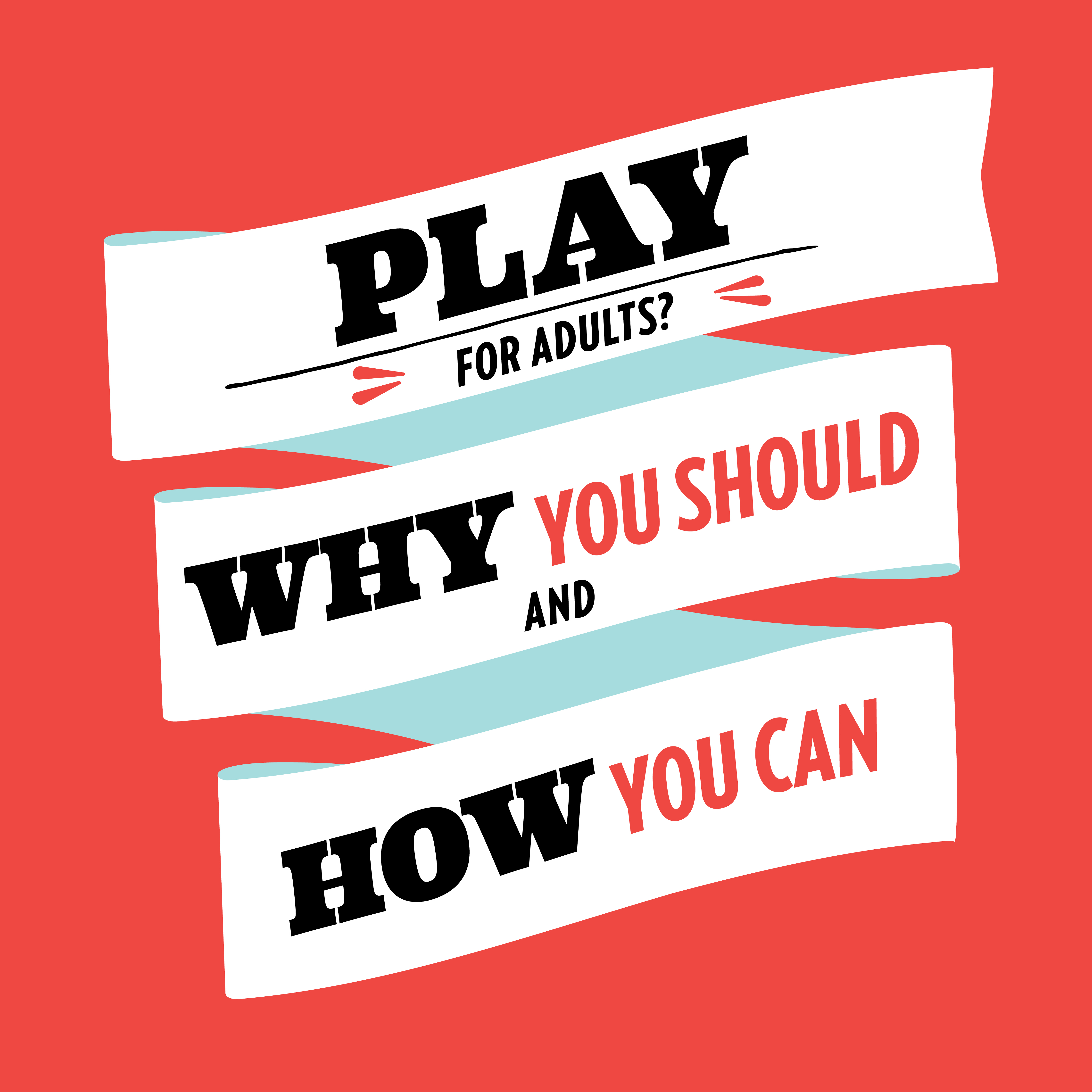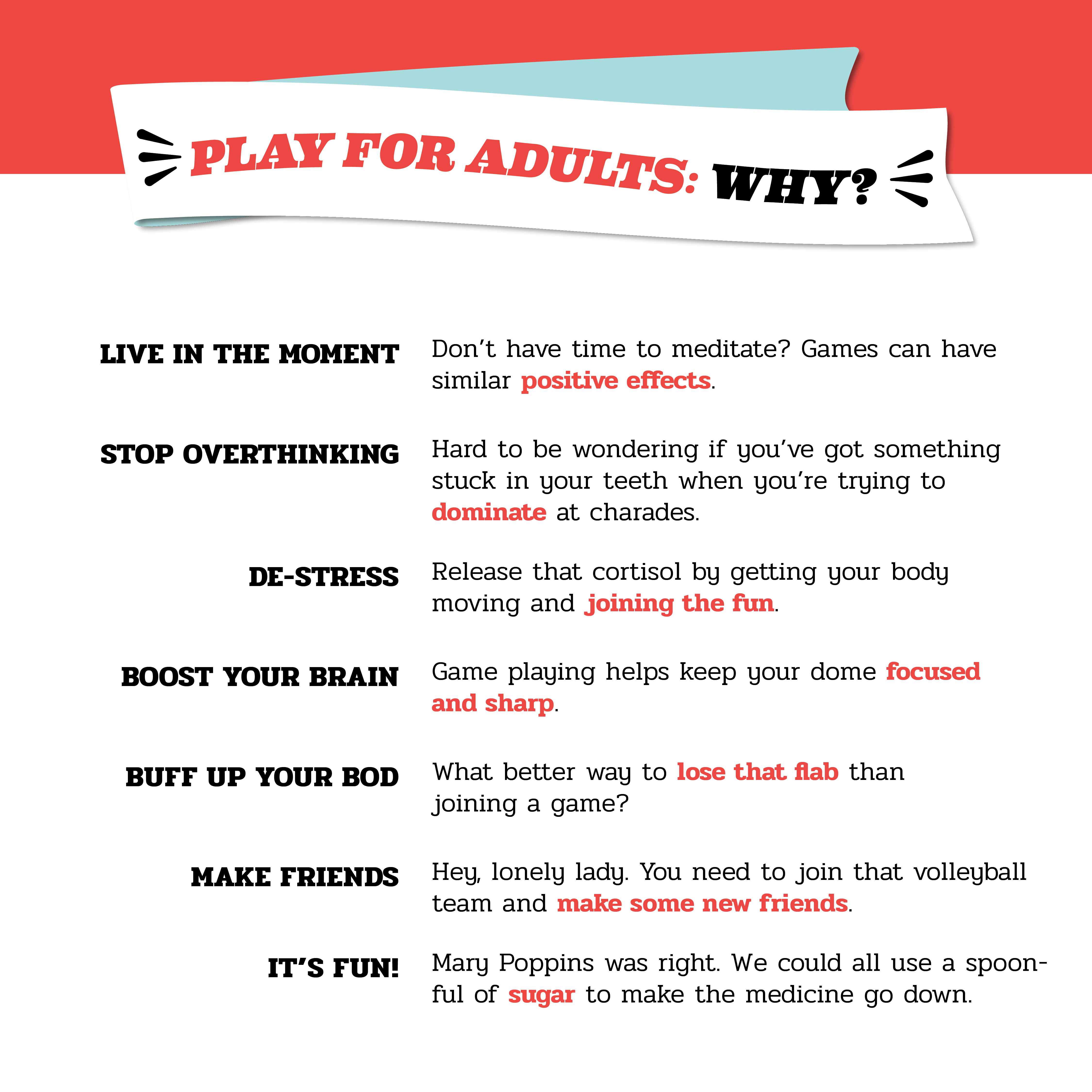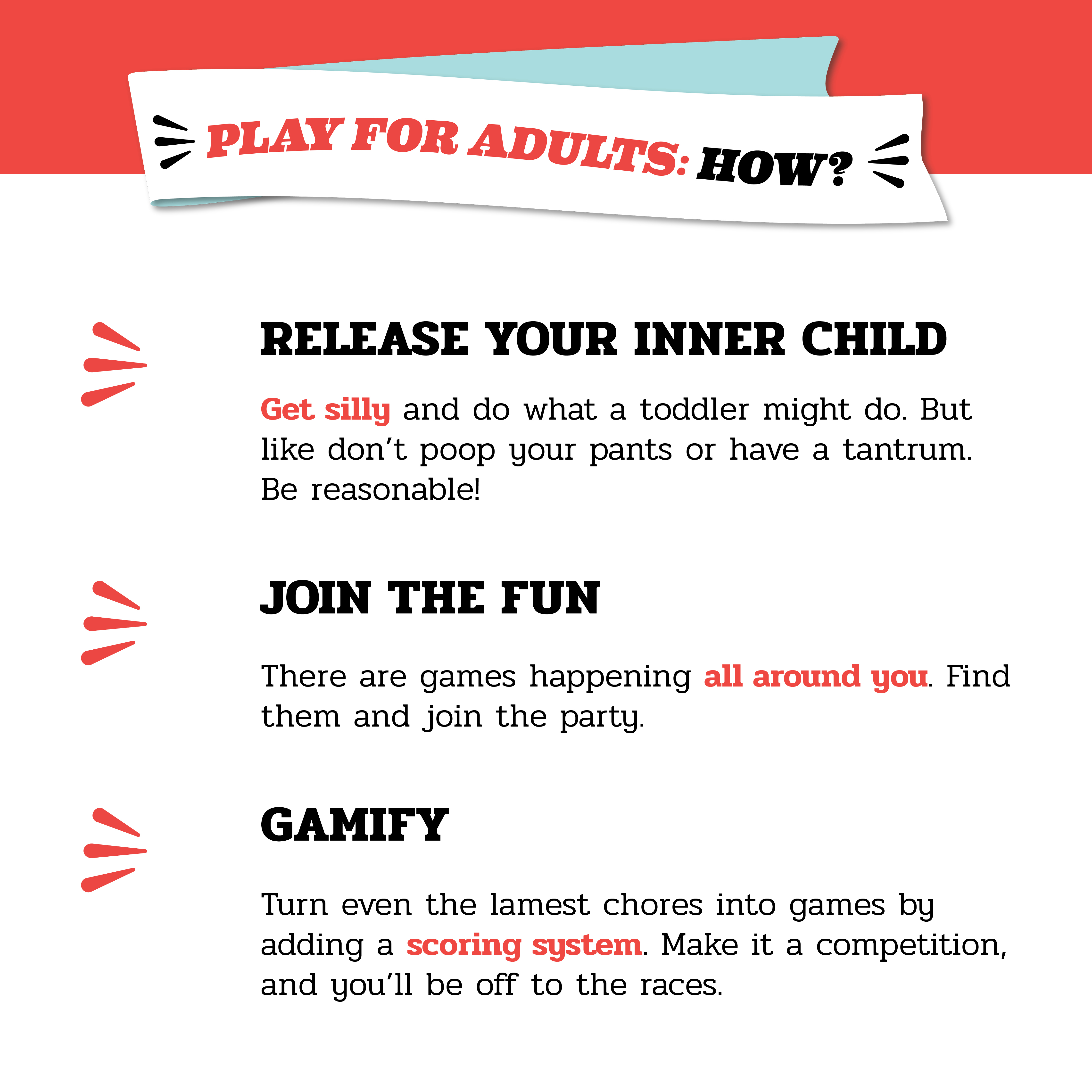
When you think of the characteristics of an adult, what do you think of? Responsible, boring, mature, serious, tired? That’s a problem. Sure, we have more responsibilities when we enter adulthood—raising children, making money, saving democracy as we know it, but that doesn’t mean we have to be boring and stressed out all the time. It’s time play for adults entered the mainstream. Here’s what it is and why and how you should add it to your life today, you stress-bucket you.
What is Play?Google tells me that “play” is an “activity engaged in for enjoyment and recreation, especially by children,” and I have some notes. Sure, children are super good at playing. It’s their job to play. But that doesn’t mean they should be the thought experts in the topic. Let’s reclaim play for adults. |
.jpg?width=5000&name=robert-collins-tvc5imO5pXk-unsplash%20(1).jpg)
Types of Play
1. Childlike
The first way you can find enjoyment in activities is to be more childlike. Now, I’m not talking “childish.” I don’t want you screaming and yelling and pooping your pants. Being childlike means you aren’t afraid to get silly.
Being childlike might mean you find joy in the ordinary things in life like marveling at a mushroom you spot on the ground or imitating the hoot of a barn owl. Children aren’t afraid to act silly and make mistakes. They haven’t started worrying so much about what everyone thinks of them. So learn a lesson from the kids. Enjoy the moment, be curious about the world, and don’t think about what people think of you.
Just don’t poop your pants.
2. Gamify
Another kind of play is game-based. Board games and sports are both types of play, and you can even make other activities more fun by gamifying them. This means adding points, rules, and some competition, so you get more into the activity and have more fun.
To gamify doing the laundry, you could time yourself and try to beat your old score. I’ve gamified my daughter’s morning routine by giving her points for each task she needs to complete and then timing her to see if she can do all her morning tasks in record time.
3. Find the Game
You can also do something that improviser’s call “finding the game.” Finding the game isn’t the same as gamifying. When you find the game, you are paying close attention to your surroundings, so you can notice fun details that can be exaggerated or enhanced. When you turn something into a fun pattern, you’ve found the game.
For example, if I notice that my friend has told an embarrassing anecdote, I can tell my own embarrassing anecdote to turn it into a game. If I notice my daughter singing, I can join in the fun and make singing with her the game. Finding the game is about being genuinely tuned in and curious about the world and then joining in the fun when you can.
4. Collaborative
Another type of play is collaborative or team play. When a group of people is riffing, improvising, or just generally collaborating, this is a type of creative play.
One of the best ways to get the most of this type of creative group play is to “Yes, And” each other. “Yes, And” is the improv principle that says teammates should agree with each other’s realities and then add onto those realities.
For example, if I’m brainstorming with my co-workers and someone says we should start a campaign that involves cute kittens, I should go along with the idea and then add onto it. Maybe I could add that we could have the cute kittens fending off a horde of killer zombies. Oh wait, someone already thought of this idea.
The idea behind “Yes, And” is that more people contribute more ideas when they feel like everyone’s ideas are being heard and valued. There will be plenty of time to critique and delete ideas later, but when you’re playing, it’s best to “Yes, And.”

Reasons to Play
But why would play for adults be important? Why is it valuable for adults to get silly, play games, and be creative?
1. Live in the Moment
First of all, play helps you live in the moment. Have you ever had that experience of playing a sport or some kind of silly kid’s game and you just get so into the zone that time flies by? That’s what Dr. Csikszentmihalyi calls “flow.” Flow is an optimal psychological state that occurs when our skills and the difficulty of the task at hand match. It doesn’t happen when things are too easy or too difficult.
Play is a great way for adults to experience flow states, especially since you have to focus so intently on what you’re doing when you’re immersed in playing.
2. Stop Overthinking
Another benefit of playing is that it helps us stop overthinking. Try thinking about what you need to buy at the grocery store while you’re playing a rousing game of Pictionary. It’s tough to do. See, our conscious brains can only focus on one thing at a time, so getting into the zone while playing is a great trick to stop those pesky worries and enjoy the act of playing.
3. De-Stress
Play can also be a natural stress reliever. Studies have shown that laughter, a side-effect of play and playfulness, helps to reduce stress hormones and increase endorphins. But it doesn’t take a scientist to tell you that laughter makes you feel good.
4. Boost Your Brain
Play is also great for your brain development. Playing games can help lower your risk of dementia and boost your memory.
5. Buff Up your Bod
It’s also good for your overall health and physique. Play helps you get your body moving, which is essential for your muscular and cardiovascular health.
6. Make Friends
Play can also be a social affair, which means you have to collaborate with others. That means you build your social skills while setting yourself up to make new friends but keep the old.
Whether you join the local volleyball league or throw a frisbee in the park, play helps you connect and reconnect with other humans, which helps you live a longer and more fulfilling life.
7. It’s Fun!
And last but not least, play is fun. I shouldn’t have to convince you to play at all because it’s, by its very nature, fun. The bonus of play is that it keeps us coming back for more. Turn eating healthy or cleaning the house into a game and you’re much more likely to stick with it. That’s why book clubs and exercise buddies are so powerful and popular. When we turn activities into games, we have more fun and are much more likely to invest more of our time doing them.

How to Add Play to Your Life
So, let’s say I’ve convinced you that play for adults is no laughing matter. You’re eager to start playing but don’t know where to begin. Here are some ideas for how to add play to your everyday routine.
1. Observe Children
Children are natural play experts, so watch and learn. Notice what kinds of games they play and then try them out for yourself.
2. Get Silly
You can’t be too cool for school when your playing as an adult. So get silly and throw caution to the wind. Think dance breaks and funny faces.
3. Gamify Unavoidable Tasks
Have a task or errand that you loathe but can’t avoid? Turn it into a game. Race against the clock or come up with a scoring system to make your otherwise boring task a blast.
4. Keep a Play Journal
Keep track of things that make you laugh and different ideas for how to play in a journal. If your life is play-free, you might need to do a play-inventory to gather some ideas before letting loose and playing.
5. Be a Copycat
Mimicking is central to many types of play. Find someone you can play with and copy each other. Play follow the leader or exaggerate each other’s movements.
6. Move Your Body
Get off the couch, go outside, and move your body. You don’t have to have a game plan. Just start moving and see what happens. Dance, walk, run, wiggle. Try all the action words.
7. Be Curious
It’s tough to be playful when we feel like we’ve seen it all, so pretend like you haven’t and get curious about the people, places, and things around you.
8. Dedicate the Time to Play
Carve out time to play each day. This might mean joining a local sports team or putting your phone away and playing with your kids. It might mean playing fetch with your dog or playing cards with friends. The key is to let yourself get immersed in whatever it is you’re doing. Focus on the game at hand, so you can enjoy all the benefits of play.
And I don’t care if you’re 23 or 103, play for adults is the magic ingredient that’s going to help us stay connected and sane and enjoy our fulfilling long life.
.jpg?width=800&name=robert-collins-tvc5imO5pXk-unsplash%20(1).jpg)